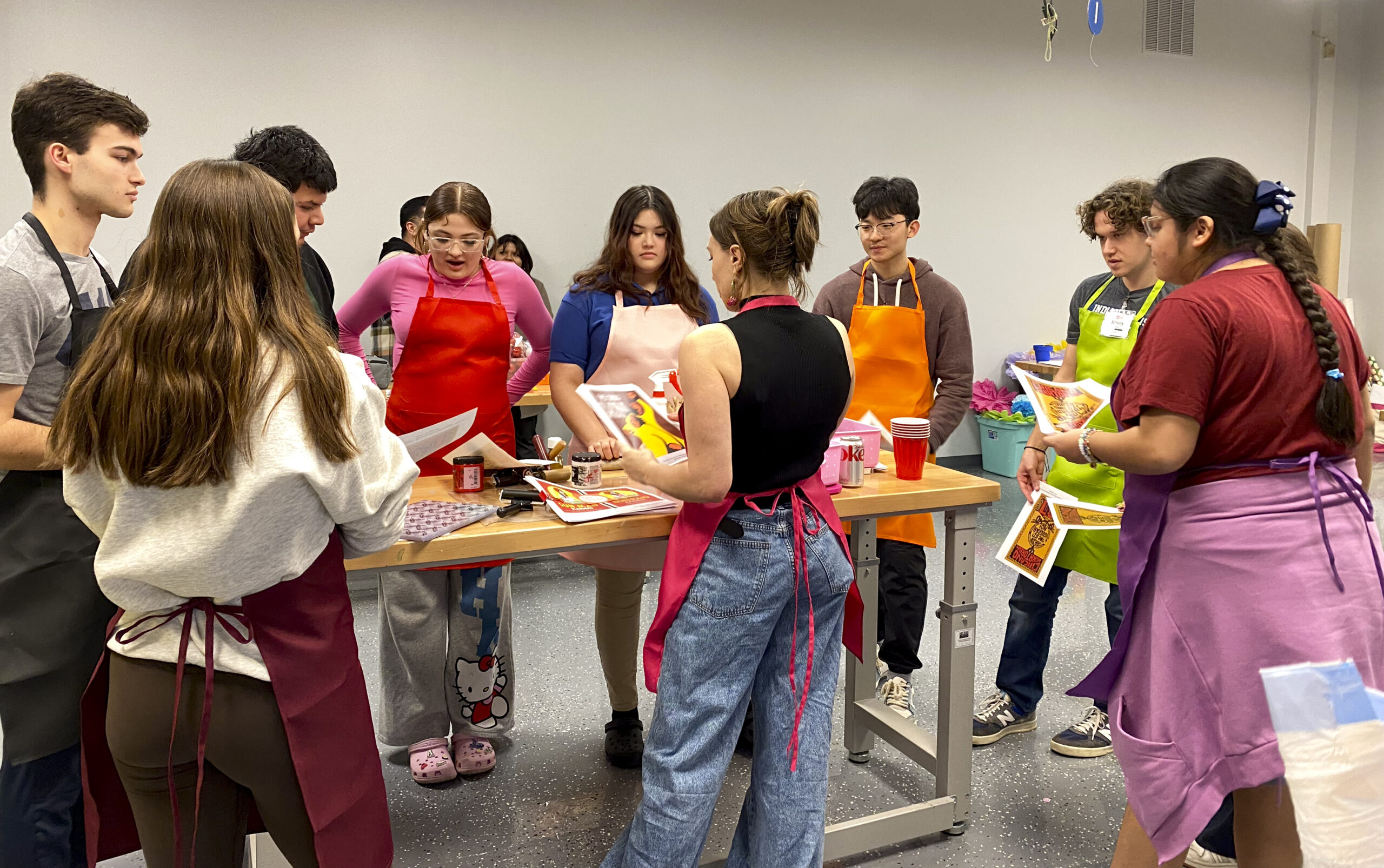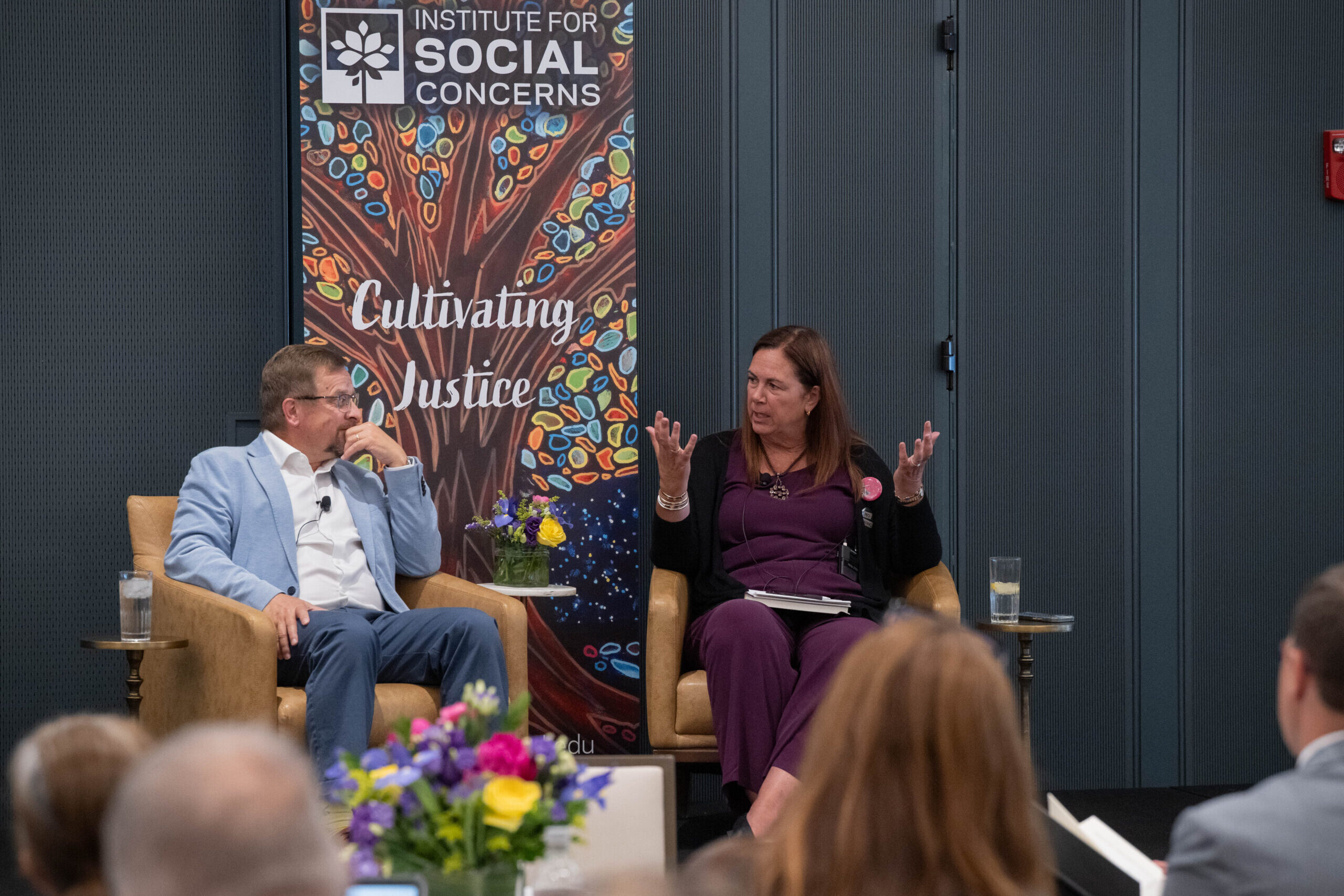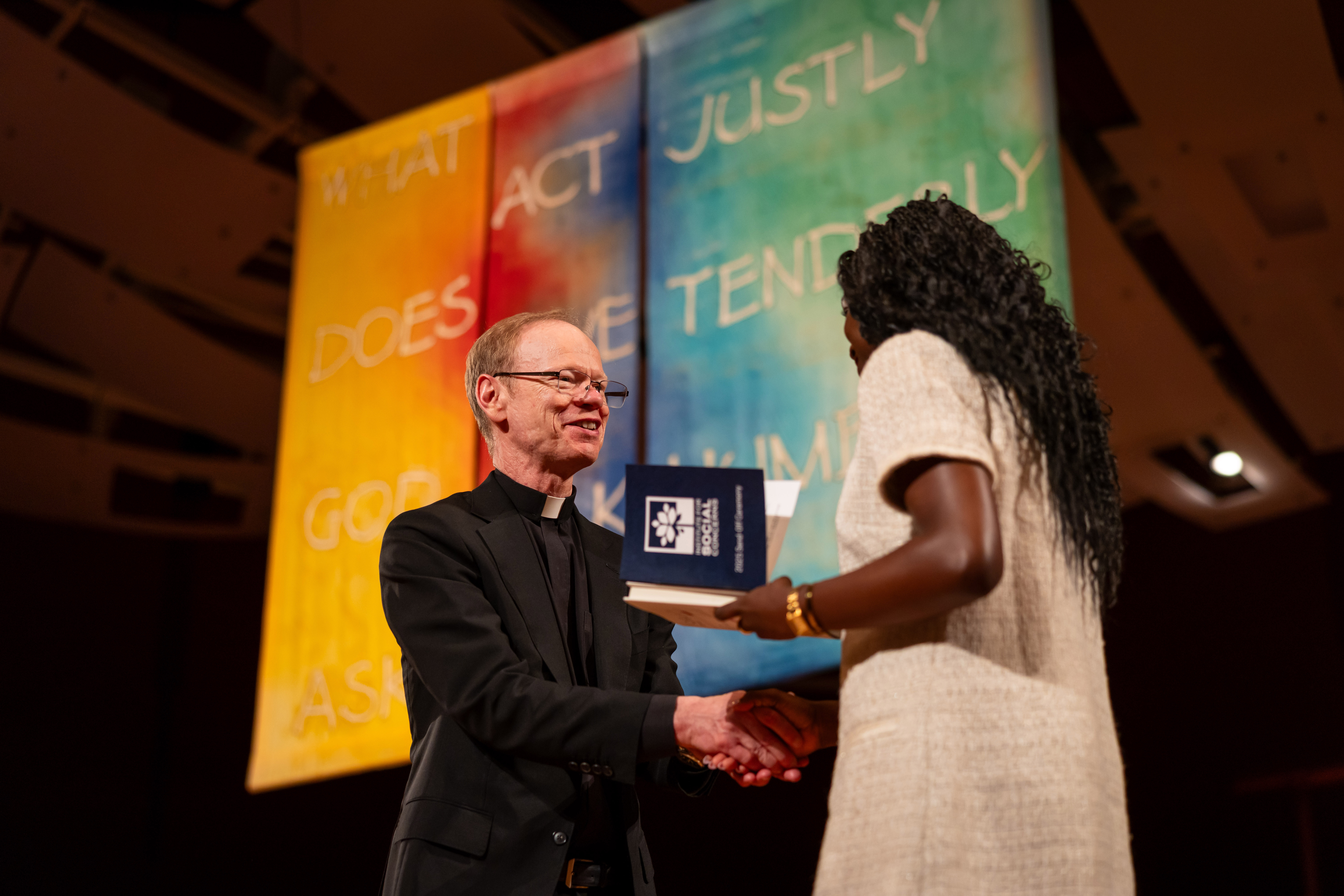Bryan Stevenson delivers powerful message about ‘proximity’ at 2024 Rev. Bernie Clark, C.S.C., Lecture
October 18, 2024
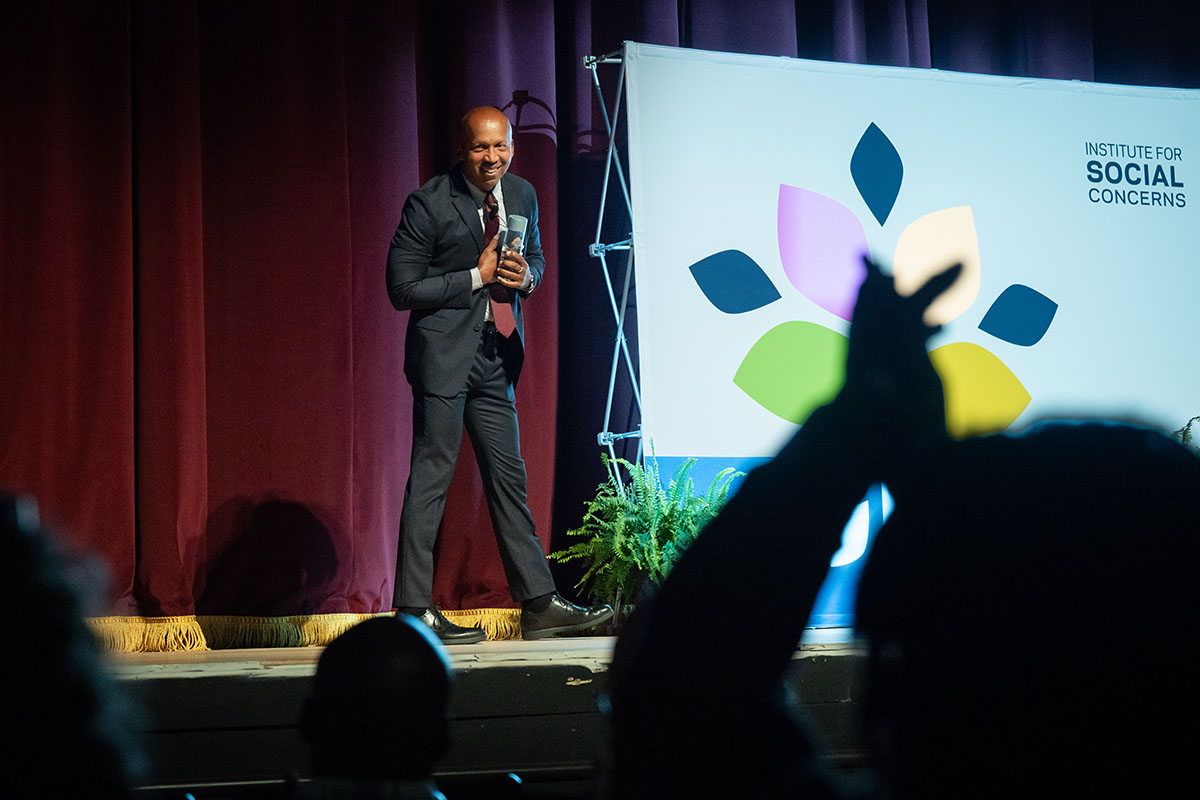
A maximum-security prison in rural Georgia was the place where everything changed for Bryan Stevenson.
He was still a law student, interning with a human rights organization at the time, and felt unqualified to help the man on death row that he was about to meet. When the shackled man entered the room, Stevenson nervously informed him that he was not at risk of being executed in the coming year.
The man embraced Stevenson, and their one-hour scheduled meeting turned into a three-hour conversation.
“We just started talking and I forgot that I was a law student and he was a condemned person on death row,” Stevenson said on Oct. 15 while delivering the Institute for Social Concerns’ 2024 Rev. Bernie Clark, C.S.C., Distinguished Catholic Social Tradition Lecture.
But the more remarkable thing happened when the prison guards broke up that meeting and started to roughly push the condemned man out of the room and back down the hallway toward his cell.
The man closed his eyes, threw his head back, and started singing a hymn.
Stevenson, now an acclaimed public interest attorney and founder of the Equal Justice Initiative, recited that hymn on Oct. 15 to a hushed audience in the Morris Performing Arts Center in downtown South Bend.
I’m pressing on the upward way,
New heights I’m gaining every day;
Still praying as I’m onward bound,
“Lord, plant my feet on higher ground.”
Some 40 years after that meeting in Georgia, people ask Stevenson about the secret to his success. He and his staff have won reversals, relief, or release from prison for hundreds of clients. He’s won landmark cases at the U.S. Supreme Court. His memoir, “Just Mercy,” was adapted into a feature film with actor Michael B. Jordan starring as Stevenson.
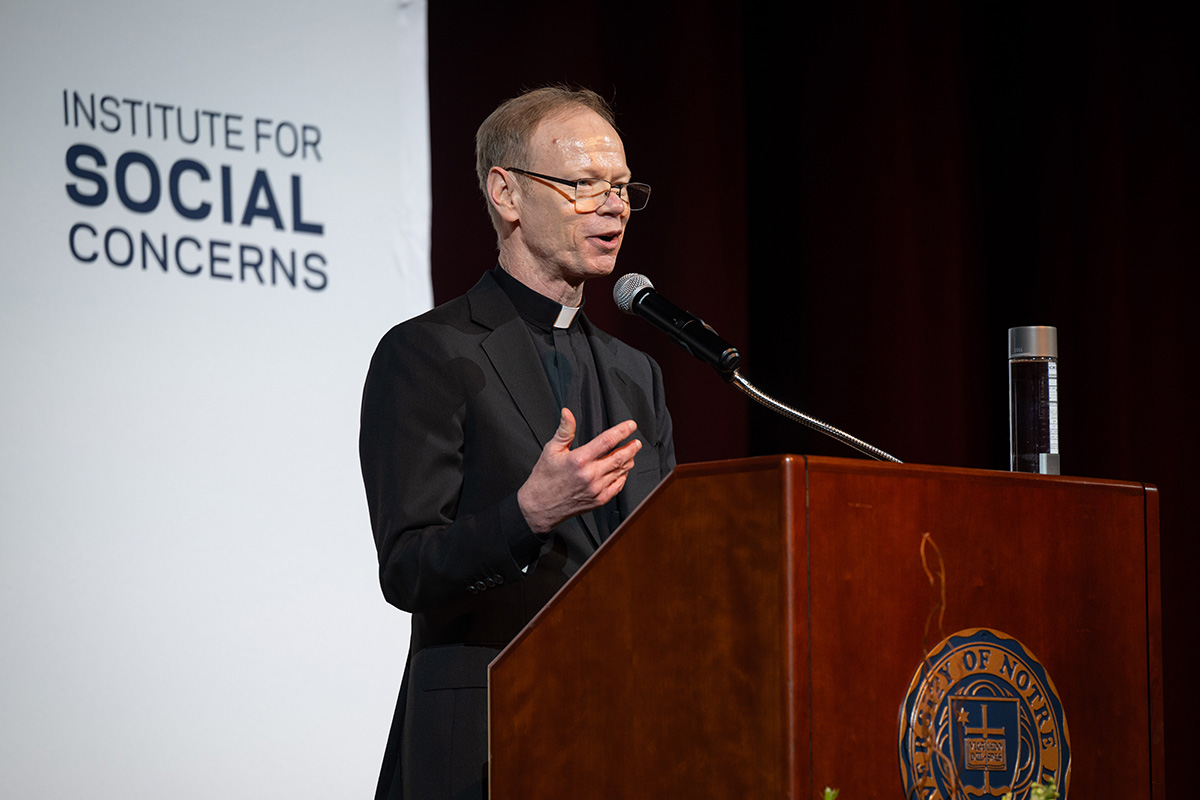
Stevenson said he’s been able to find success for his clients not simply because he worked hard or had the right strategy.
“It’s because I got close enough to a condemned man to hear his song,” Stevenson said.
“And what I believe is that in poor communities all across the world, in places where there is suffering, and places where people have been marginalized in jails and prisons, and places where people have been oppressed and pushed down, there are still songs being sung,” he said.
“When you get proximate, you hear the songs. And those melodies in those songs will empower you, they will inspire you, and they will teach you what doing justice and loving mercy is all about,” he said. “That is why I’m urging you — all of you — to find ways to get closer to the poor and the excluded, the marginalized and the neglected, and to go with an open heart and listen for the songs that will teach you the things we need to understand.”
Get proximate.
Proximity is an approach to working alongside communities as well as a research methodology that the Institute for Social Concerns has employed in its scholarly work and in its pedagogy since 1983.
Tuesday was a pivotal moment in the institute’s 41-year history, as its name officially changed from the Center for Social Concerns to the Institute for Social Concerns. The slight change in name represents the decades-long evolution of the center into a university-level academic institute with faculty, students, and community partners from multiple disciplines and walks of life all working together to build a more just future — for the common good and for human dignity, face to face with or in proximity to marginalized communities.
Stevenson’s lecture was a fitting celebration of this moment, and encapsulated the power of the institute’s approach to research, to education, and to critical conversations.
In addition to being the Institute for Social Concerns’ first event as an institute, this was the first time that the Rev. Bernie Clark, C.S.C., Lecture was held off campus. The location at the Morris Performing Arts Center in downtown South Bend drew community residents as well as Notre Dame faculty, staff, and students.
The environment was electric inside the ornate, century-old theater as the audience listened to Stevenson. The silence of rapt attention was interspersed here and there with people calling out to voice their agreement. The crowd broke into applause multiple times during the lecture and gave Stevenson a standing ovation at the end of his talk.
“Change is often hard and messy. But I think everyone in that theater went home Tuesday night with an inspired sense that change for the better is possible, that it’s not naive to be hopeful, and that there’s a real framework for building a more just world,” said Suzanne Shanahan, the Leo and Arlene Hawk Executive Director of the Institute for Social Concerns.
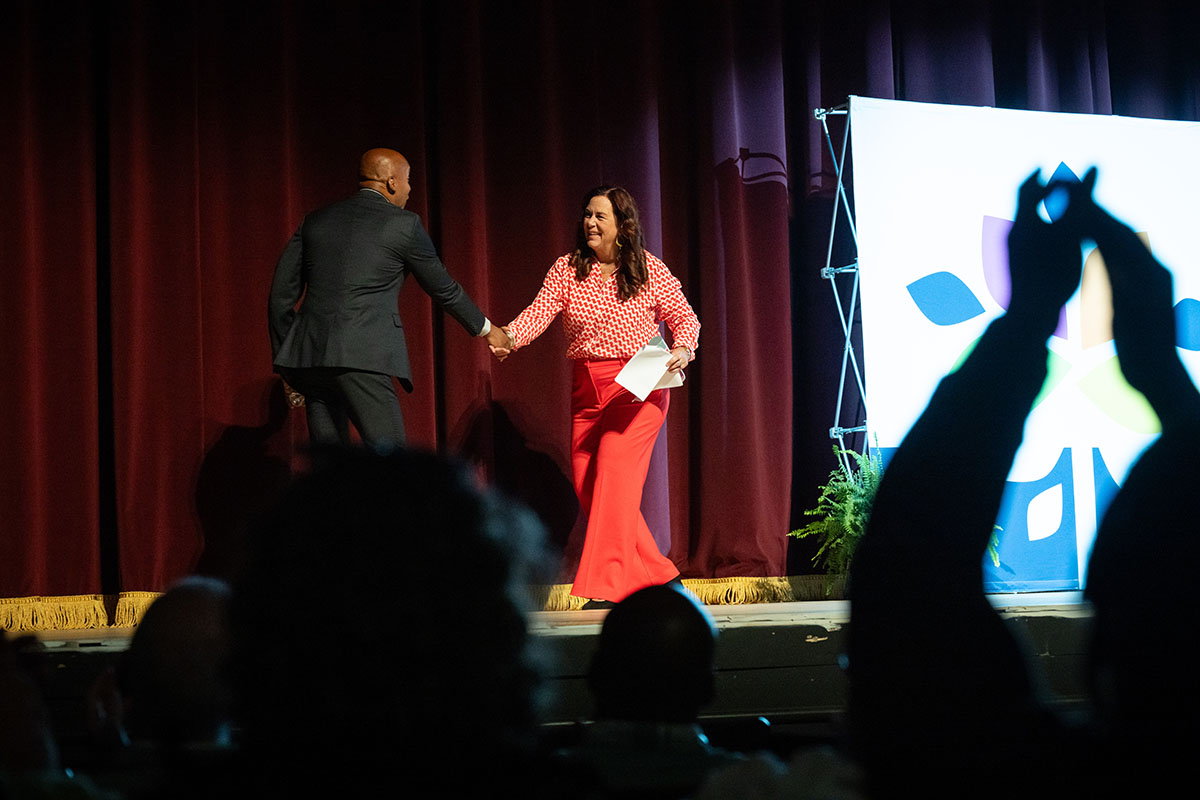
“This is why the Institute for Social Concerns emphasizes proximity in our research and teaching, this is why we put human dignity at the core of everything we do,” Shanahan said. “It was beautiful for our community to be able to hear Bryan Stevenson express those same themes so powerfully.”
Throughout his lecture, Stevenson made his points through stories about real people he has encountered in his life.
He talked about children and young teens deemed by the courts to be “adults” and sentenced to serve time in adult prisons. He recounted the story of a Black woman in Alabama who had a tense meeting and then a profound connection with a white man she met on a remote dirt road while collecting soil from a lynching site. He described meeting an elderly man in a wheelchair who called his scars from the Civil Rights Movement his “medals of honor.” And he recalled an intellectually disabled man on death row who broke through his speech impediment to tell Stevenson “that I love you for trying to save my life.”
Stevenson’s stories underscored the reality of big issues like mass incarceration and racism, and how the individuals most affected by those issues experience them physically and emotionally in their lives.
And they illustrated the power of proximity.
But, Stevenson emphasized, proximity is not enough to raise what he called the justice quotient. The journey may start with proximity, but other steps need to follow.
One step is challenging and changing narratives that feed bigotry and hatred and violence. Those narratives lead people to tolerate things they should never tolerate, Stevenson said.
The idea in the criminal-legal system that “some children aren’t children” is a narrative that needs to end, he said. The narrative of white supremacy that was created to justify slavery in America has persisted and needs to be confronted, he added.
“When people hear me talking about slavery and lynching and segregation, sometimes they think I want to punish America for this history. I have no interest in punishment. My interest is liberation,” Stevenson said.
“I genuinely believe that there is something better waiting for us. There is something that feels more like freedom, more like equality, more like justice. It’s waiting for us, but we cannot get there if we do not find the courage to speak truthfully,” he said. “And people of faith have a particular role to play in this, because we are supposed to know something about this relationship between truth and redemption, truth and restoration.”
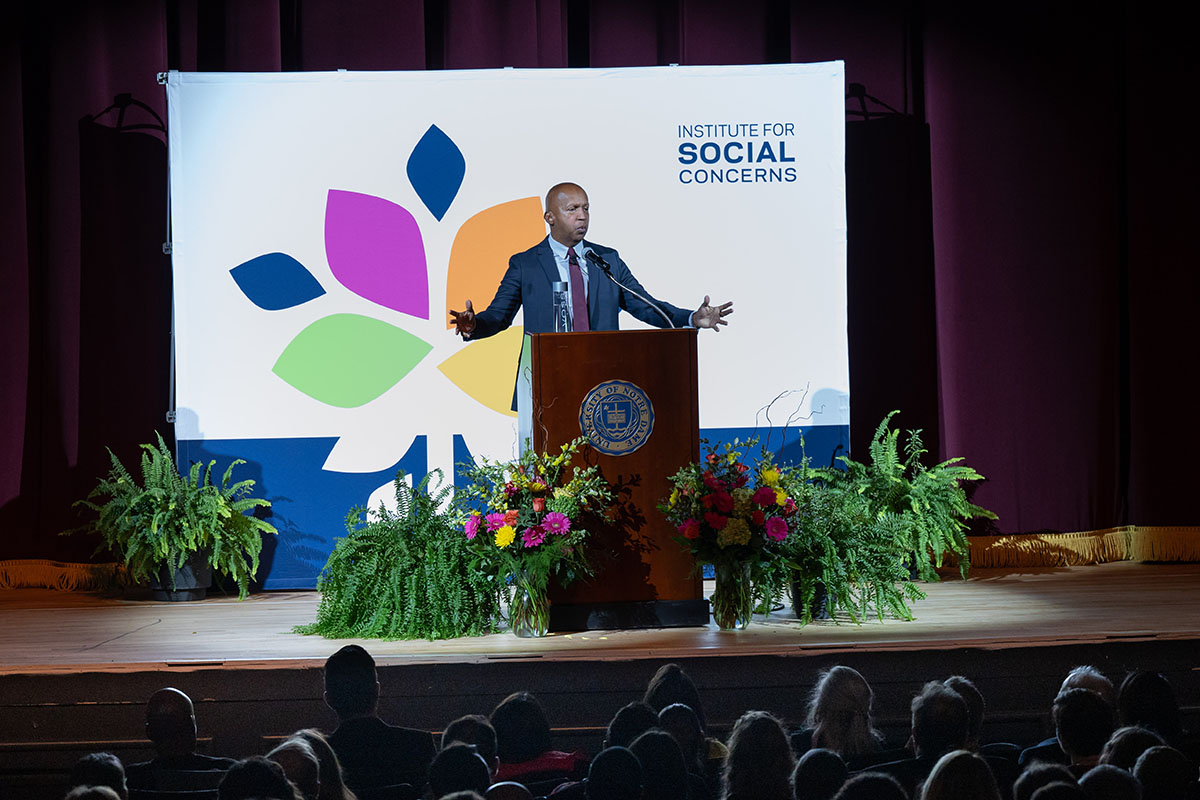
After getting proximate, and challenging and changing narratives, the next steps to raising the justice quotient are: be hopeful, and be willing to do uncomfortable things.
“We cannot allow ourselves to become hopeless about all of the ugliness and the violence and the division that we’re seeing around us,” Stevenson said, “because I am persuaded that hopelessness is the enemy of justice, and injustice prevails where hopelessness persists.”
He addressed Notre Dame students, faculty, and staff directly in challenging them to do their part to raise the justice quotient.
The University is a powerful institution with a remarkable history, he said, but he doesn’t believe it will be judged by success in athletics or accomplishments in the classroom. “I believe we’re going to be judged by the percentage of people in this community that are willing to get proximate to the poor and the excluded, to change the narratives, to stay hopeful.”
In addition to being this year’s Rev. Bernie Clark, C.S.C., Distinguished Catholic Social Tradition Lecture, the event with Stevenson was also part of the 2024-25 Notre Dame Forum, which is organized around the theme “What do we owe each other?”
The lecture was co-sponsored by several other units at Notre Dame: the Department of American Studies, the Klau Institute for Civil and Human Rights, the Initiative on Race and Resilience, the Law School, and the Office of the President.
Related Stories
-
Summer of Social Concerns—students engage in justice research around the globe
-
Printmaking history—the institute partners with community to celebrate South Bend’s Latino heritage
-
Forming character through friendship—Virtues & Vocations conference promotes human flourishing in professional education
-
Go be justice—Sending off graduates to work for the common good
-
ReSearching for the Common Good: O. Amandhi Mathews


